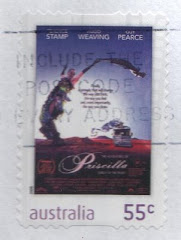Sydney Opera House
(for Shikha who asked me today to write it)
19h30 - 24th of August 2011
 |
| Her majesty sailing in Sydney Night Sky |
 |
| Like a Sail opening to absorb the Crowds |
 |
| Sydney Harbour Bridge opposite |
 |
Mi-Sail Mi-Pyramid shapes |
 |
| My ticket that night |
Sydney was my first port of call in Australia. I spent two years living and working there when I was 25, so it felt very special coming back to this familiar place. Yet, I was far from being a local: when my colleagues took me for lunch and I had to quickly order a cold beer, I did not remember which beer, and made a huge faux pas: I said a 'XXXX' as I could not recall quickly enough the name of the local beer. I knew that second I had offended. The barmaid looked at me and said: what ? ... no, we don't have any...quickly I corrected: 'a Toohey', but I knew I still had it wrong, the one I really liked was a VB (Melbourne beer Victoria Bitter), but it came back to me 25 seconds too late!
My colleague smiled at me: 'it has been a while since you have not come back to Sydney'
Correct: 15 years,
(except for a short one night business trip in Alexandria suburb a month ago to present myself to the new company I would be working for over the next six months on an international trade software localisation project)
So I had to make this exceptional visit taking me out of the private sphere special
And I did
As I quickly checked the web, I found out an Opera was being sung in French at the Sydney Opera House, what a nice coincidence.
I thought, 'no excuse' ...
I thought, 'no excuse' ...
I decided to try my luck and I managed to secure a reasonably priced ticket. I was placed on the second row, so close to the scene, I could see the musicians in a room under the theatre scene. They were tuning their instruments in semi intimacy, not many people could see them.
I was close enough to see the opera singers and I could appreciate their acting performance fully, not missing out on their craft for facial expressions. I could see them breathing as they projected their voices not unlike an athlete, in a very controlled manner, yet, still able to project crafted emotions.
I was close enough to see the opera singers and I could appreciate their acting performance fully, not missing out on their craft for facial expressions. I could see them breathing as they projected their voices not unlike an athlete, in a very controlled manner, yet, still able to project crafted emotions.
As I was watching the musicians, listening to Delibes' music and listening to Lakmé and Frederic's humble voices, I decided right then:
the human voice is the most beautiful instrument in the world.
Lakmé is an opera in three acts by Léo Delibes, inspired from Pierre Loti's novel Le mariage de Loti (1882). First performed in Opera comique in Paris in 1883, it was now performed in the Opera Theatre, Sydney Opera House for the first time that day.
It is a love story between a semi-goddess, Lakmé, whose purity is central to her community, whose religious beliefs represent a defiance to colonial occupation, and a romantic British soldier, Frederic, engaged to be married. It is meant to go wrong before it started, and as they see the abyss, they go straight for it.
I loved it when Frederic answered Lakmé. As the strange fever was burning in her own heart, she asks what God gives him such courage, and his reply-- 'Le Dieu de la jeunesse, le Dieu du Printemps, le Dieu de l'amour' / 'the God of Youth, the God of Spring, the God of Love'
I loved it when Frederic answered Lakmé. As the strange fever was burning in her own heart, she asks what God gives him such courage, and his reply-- 'Le Dieu de la jeunesse, le Dieu du Printemps, le Dieu de l'amour' / 'the God of Youth, the God of Spring, the God of Love'
It is mostly famous through the 'Bell Song' http://www.youtube.com/watch?v=ju-oCQxZ9hs with not a word spoken, pure VOICE !!!, an incredible moment for me when one can pause for a moment on voice without language, and 'Viens Mallika' http://www.youtube.com/watch?v=CuEcleIFPlw that I recognised from my childhood and which came as a surprise to me. It was a nice moment, because coming from so far away in my memory, and so familiar yet in an unfamiliar place.
It has been commented that this is British imperialism seen through a particularly mischievous French sensibility.
There is definitely traces of misplaced perceptions of exoticism straight out of the XIX's century, but fortunately, this is not central to the play.
It has been commented that Delibes reserved his most involving music for the central love story and the moments of local colour.
I was particular sensitive to the fact that it was sung by non native speakers, and I had reservation they would be able to reach my emotions for that reason but they did - this again was a surprise, and I liked it all the more that they could do such an incredible job
In my mind, they were going to sing the French words mechanically. Far from it, it was heightened because you could size the extra effort they had to put in it.
From the height (?) of the XXIst century perspective, the author Michel Parouty concludes : "This tale of eternal love still makes Auntie Meg reach for her hankie; and who's complaining?"

